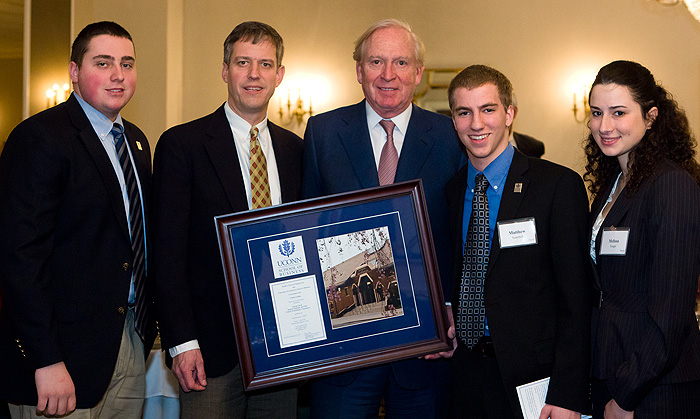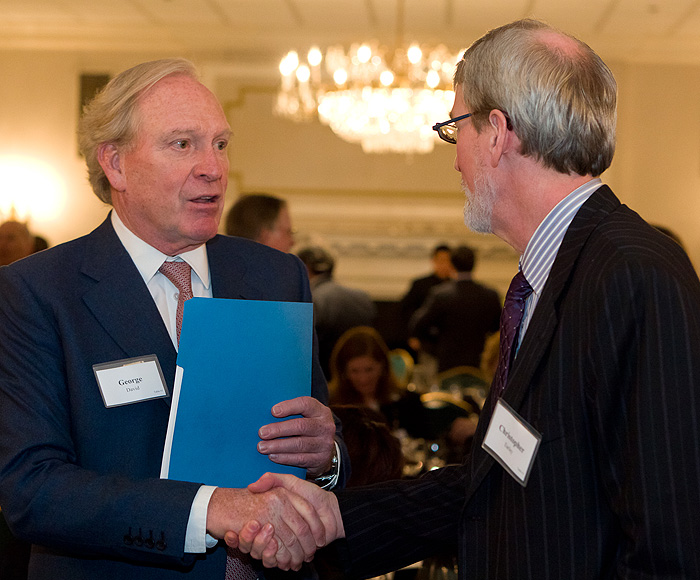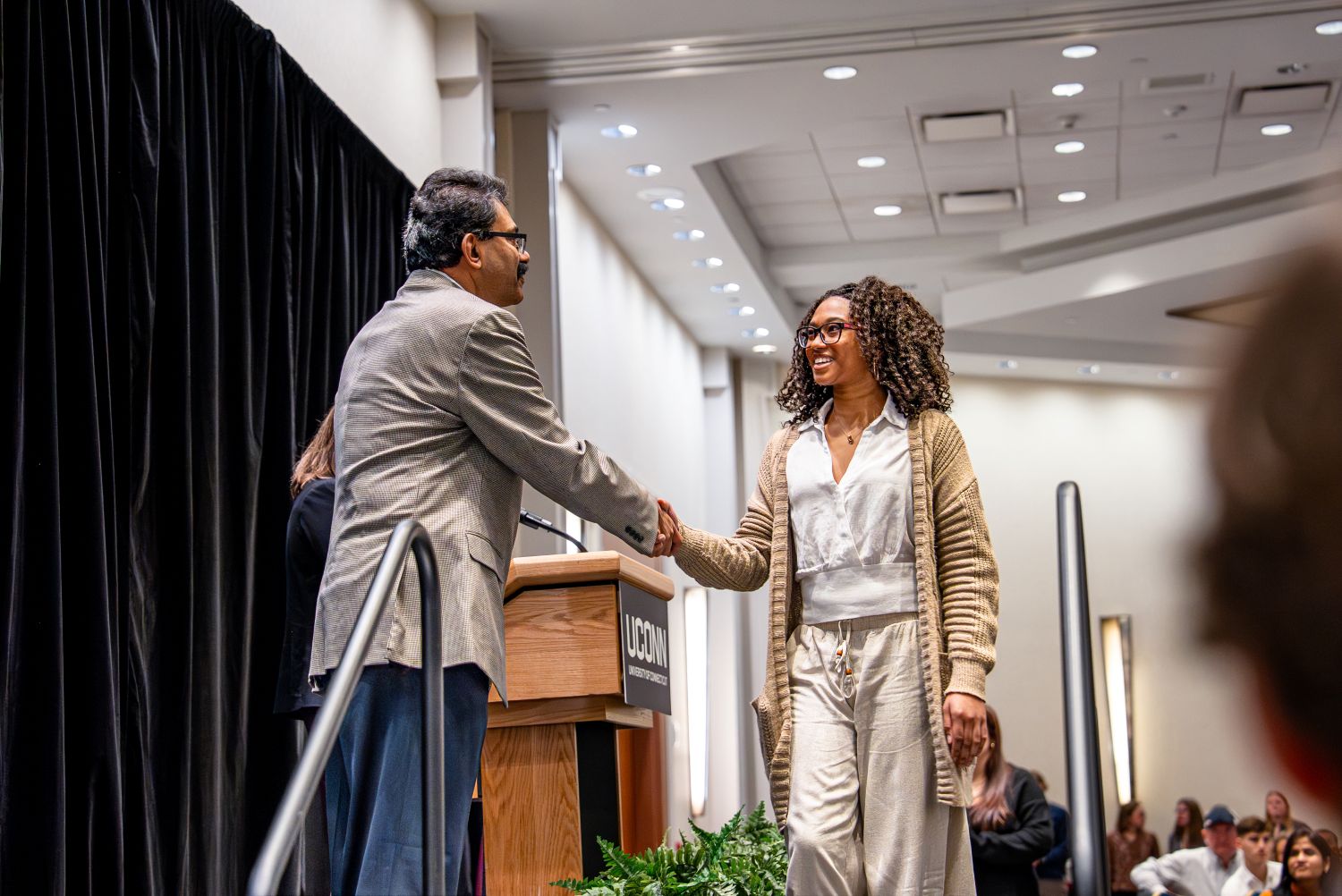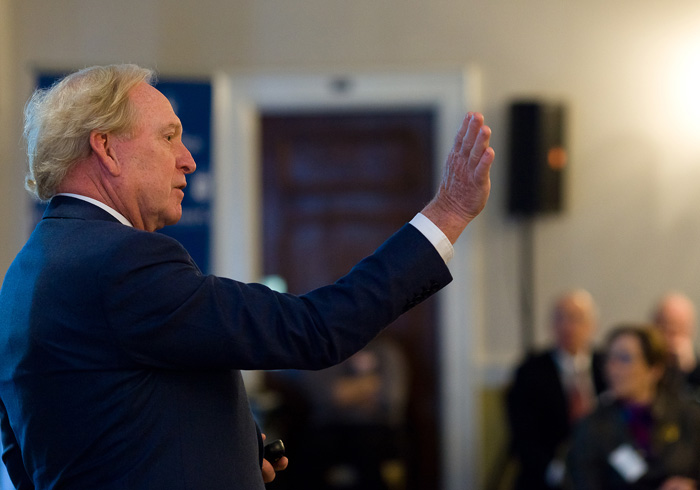
George David, who led United Technologies Corp. (UTC) during a “remarkable period of change and growth,” said last week that the keys to a company’s success can be summed up in five words: productivity, globalization, technology, portfolio, and organization.
If the top managers of a corporation focus on those themes and act accordingly, then success will almost certainly follow, said David, who joined UTC in 1975, became its president and chief operating officer in 1992, chief executive officer in 1994, and chairman in 1997. He stepped down as CEO in 2008, concluding a 14-year stint during which UTC’s earnings per share increased sixfold, outshining its major rival, General Electric.
David was the featured speaker at a Hartford Club luncheon sponsored by the UConn School of Business, Trinity College, and the Hartford investment management firm of Bradley Foster & Sargent Inc. In attendance were local business leaders, and faculty, staff, and students from the two schools.
In his introductory remarks, Robert H. Bradley, president and CEO of the investment firm, said David had clearly earned his “place in the pantheon of CEOs in the United States who had taken good companies to greatness.”
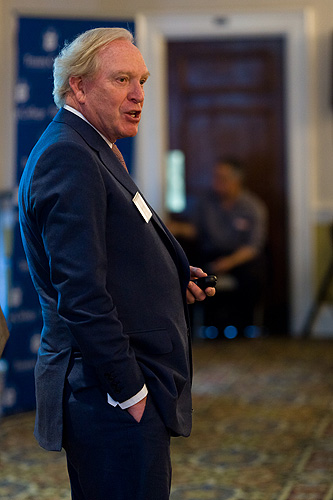
Not only did David’s leadership result in remarkable prosperity for UTC and its shareholders, but during his tenure, UTC was a model corporate citizen, contributing to the communities in which its subsidiaries are based and also reducing its carbon footprint and greenhouse gas emissions.
In recognition of his achievements, David has been named to several “Best CEO” lists, including those of BusinessWeek, Barron’s, Institutional Investor, IndustryWeek, and Worth magazines. Indeed, during David’s tenure at UTC, the corporation’s total shareholder return ranked first among the Dow 30 industrials.
The theme of David’s talk, “Lessons from a CEO,” focused on the five objectives that senior management teams should strive for. The first is productivity. “I learned at UTC that you can always do things 10 times better,” he noted. The best way to become more productive, he said, is to collapse the sequential into the simultaneous, thus eliminating waste from the system and creating a single combined operation.
In an era of developing nations with fast-growing economies, thinking and acting globally is critically important. “Get there first” was one of David’s goals in guiding UTC. When David first arrived on the scene. Today, that figure is higher than 60 percent.
about 25 percent of UTC’s revenue came from outside the United States
Technology is another important success factor. David said UTC has one of the largest research and development budgets of any major corporation, which has allowed innovation to flourish.
Fourth on his list is portfolio, meaning the collection of businesses that make up a corporation. Many CEOs, he said, suffer from “portfolio anxiety.” But under David’s leadership, UTC shed some companies and acquired others. By the time he left, UTC was “a powerful set of businesses – iconic trademark companies.”
Lastly, organization is a key to success. Clear lines of authority must exist, and a leader should be prepared to listen to his subordinates. Said David: “I said yes to 85 percent of what [my managers] wanted to do.”
Following his speech, David took questions from the audience. Asked about the U.S. economy, he said he believes it’s in “quite serious trouble,” due in large measure to the federal government’s massive debt, which is going to be “a drag on the economy for a very long time.” He attributed much of the problem to the government’s bailout of the financial services industry, which, he alleged, acted irresponsibly after it was deregulated. He said the deregulation of the financial services industry resulted from the massive amounts of money that sector poured into political campaigns.
If he had his way, David said, he would “blow up special interests” so that politicians’ votes couldn’t be bought.
